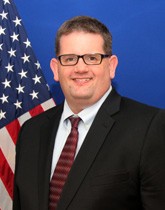
Extending Our Reach: Faith-Based Partnerships and Development
By J. Mark Brinkmoeller
For over five decades, USAID has been working with countries around the world to help the earth’s vulnerable populations. Whether combating floods or droughts, food insecurity or infant mortality, we have seen the necessity of cooperation. Some of our most productive partner- ships have been with small, local grassroots organizations that have the closest contact with those in need–groups like indigenous governing bodies, neighborhood clinics, local hospitals, and faith-based community groups.
Faith-based groups in particular are increasingly relevant partners because they are integrally intertwined with human daily life around the globe. Over 80 percent of people practice a religion, over half of the world’s schools are faith-affiliated, and many health facilities in the world’s poorest areas are associated with faiths.
Religious institutions exist in virtually every community in the world. They are respected, bringing trusted knowledge, values, and skills to communities that many other institutions cannot reach. In the developing world, faith leaders are working tirelessly to improve access to clean and safe water to combat poverty and alleviate disease among their followers. Since 2000, joint efforts to meet the Millennium Development Goals (MDGs) for greater access to water and sanitation have brought development and faith organizations together to address pervasive health and environmental issues around water. It is this kind of cooperation that led to the remarkable achievement of improving access to water two years ahead of the MDG target.
For an example of faith’s reach, take a look at the slums of Nairobi, Kenya, where over 70 percent of people get their basic healthcare from faith-based organizations and hospitals. Islamic groups and Christian groups work alongside secular development organizations there to bring clean and safe water to the most vulnerable, helping families and com- munities to thrive.
Within the United States, faith- based groups not only work on specific projects to help bring water to millions of people, but they also speak out and raise awareness on the importance of water issues. The Grammy Award-winning band Jars of Clay joined the launch of USAID’s Water and Development strategy by video during their world tour.
Faith-based groups are effective partners because they have spent hundreds of years gathering knowledge and cultivating trust, and they uniquely affect people’s behavior. USAID collaborated with over 30 faith-based groups on our Child Survival Call to Action, when we together declared, “Every Child Deserves a 5th Birthday.” Organizations like Islamic Relief USA, Catholic Relief Services, Episcopal Relief & Development, and the Center for Interfaith Action on Global Poverty have adopted this rallying cry and joined forces with us to prevent diarrheal diseases, promote good nutrition, and bring safe water, sanitation, and hygiene to children under 5.
In the field, faith leaders are especially key. In conflict-ridden and water-scarce Yemen, imams who received training supported by USAID teach mothers and children important hygiene messages. In Indonesia, Paengajian As-Salaam, a Muslim women’s prayer group supported by USAID, distributes Air RahMat, a chemical solution that purifies water. In Cambodia, monks teach important disease prevention measures like hand washing and provide HIV/AIDS care. And last year, we supported a workshop that trained Christian, Muslim, and Hindu leaders from sub-Saharan Africa on topics like sustainable water resources management and water, sanitation, and hygiene in schools, leading to over 25 new long-term plans. Now, leaders from these different faiths are working throughout the continent toward goals like teaching water harvesting in Nigeria’s Catholic schools and creating “eco- mosques” throughout Ethiopia.
These partnerships have been fruitful, but it is time to do more. With climate change intensifying, the world’s population swelling, and water resources dwindling, it has never been more important for secular and religious organizations around the world to step up and cooperate. These partnerships offer the opportunity for greater impact, wider reach, and a lasting future: A future where every family has access to clean water and enough to eat, and every child reaches his or her 5th birthday.
- J. Mark Brinkmoeller is the director of the USAID Center for Faith- Based and Community Initiatives.







Comment
Make a general inquiry or suggest an improvement.